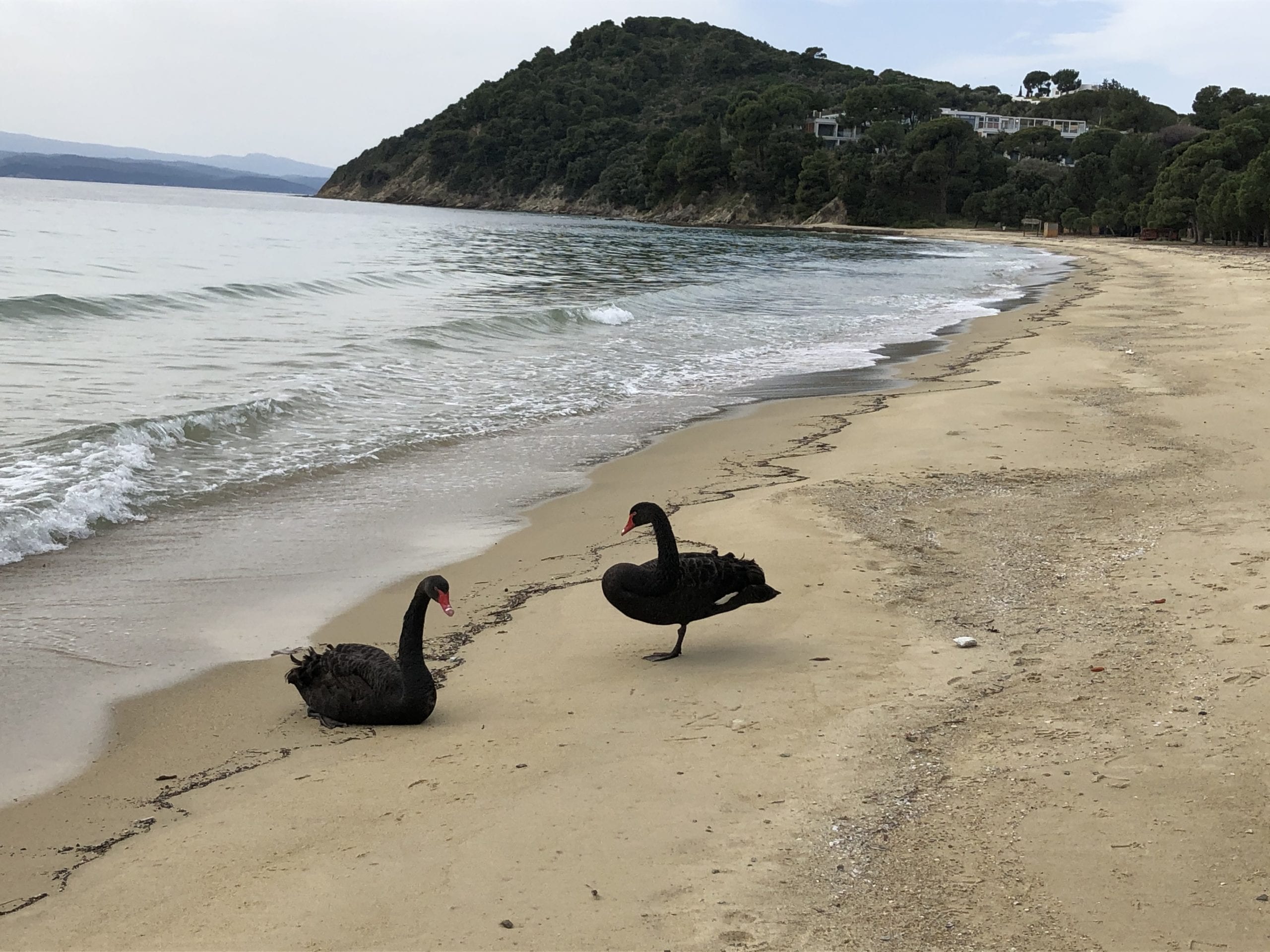A year ago this week, when we were carefree and young, I picked an apple, a banana and an orange from bins outside a small market on the Greek island of Skiathos, and went inside to pay. Music was playing. Familiar music.
“Strange days have found us,” Jim Morrison crooned. “Strange days have tracked us down.”
I sang along. This was the music of my awkward years. It became my anthem for 2020.
Backing up a couple of days, my beloved and I had traveled to the city of Volos, where I’d been asked to give a talk on fake news. That bus ride may have been the first time we sanitized surfaces with disinfectant wipes.
When we arrived at the University of Thessaly, though, we shook hands with our hosts, shared a cozy conference room with attendees of my talk and dined in a group of eight after my talk – all without masks or gloves or any thought of social distance.
After a rest day in Volos, we took the ferry to Skiathos. Only one passenger wore a facemask.
From the harbor we took a taxi to the island’s most popular beach and had it to ourselves. Well, not quite. The waters were patrolled by a flock of swans, including two black ones. I didn’t know black swans existed. Until the 17th century, when they were seen in Australia, they were thought not to.
Reading about them on Wikipedia after our encounter with them, I thought they were harbingers: A black swan, according to Nassim Nicholas Taleb, who has written a book by that title, is a high-profile, hard-to-predict, and rare event that is “beyond the realm of normal expectations in history, science, finance, and technology.”
That sounded like COVID-19 to me, though Wikipedia, admirably up to date, went on to note that Taleb considered coronavirus to be a white swan, which is to say, entirely predictable.
We spent one night on Skiathos and took a late bus back to Thessaloniki. The guy in the seat behind ours had a persistent cough, but I was not yet worried enough to move to a different row, which we could easily have done. I thought of that cough a lot over the next couple of weeks.
On March 6, the leaders of the Greek Orthodox Church pushed back at the laity’s suggestion that priests stop offering communion from a communal spoon. “Jesus Christ does not carry microbes,” one of the church fathers declared.
On March 11, Penn State announced that it would switch to remote learning after spring break. Initially, you may recall, the plan was to resume classroom instruction on April 6. At the time, there were about 1,000 known cases of COVID in the United States and 80 in Greece.
Also on March 11, Penn State summoned its far-flung chicks to return to the nest. We considered it and decided to sit tight.
On Friday the 13th, the State Department, too, urged Yankees abroad to go home. That weekend, we saw photos of massive crowds at airports as travelers returning to the U.S. waited hours to be examined before being allowed to leave the terminal. You would have thought the goal was to spread infection, not contain it.
“Things are a mess here,” a friend wrote in an email. “We have no political or public health leadership to speak of so it’s just not a good idea to travel into this clown car of a situation.”
Again we decided to hunker down.
The next week was our first taste of life under lockdown. The cafes were closed. So was Aristotle University, where I was teaching. We took walks along the waterfront and replenished the larder, but otherwise holed up in our apartment.
On March 17, a colleague gave me a sense of how the transition to remote instruction “in 4 days flat,” as he put it, was going at Penn State.
“Oddly enough,” he wrote, “it’s gone fairly well. Students are logging in. And, since I know when they respond, some are even listening. Still, I wish for the good old days — like 2 weeks ago when we were all in the same room.”
A friend who teaches studio art put it this way: “Crazy times. Never thought I would be teaching clay classes online.”
Around this time, new email sign-offs began to appear:
- “Hang in there and keep washing your hands!”
- “Wash hands and stay healthy!”
- “Hugs to you both (of the virtual/elbow kind).”
- “Warmest Elbow-Hugs,”
- “Sending virtual hugs and healthy vibes!”
On Thursday, March 19, we heard that if we didn’t get out by Sunday night, we’d be stuck in Greece for the duration, and no one knew how long that would be. And so we left after all, bound for a cabin on Spruce Creek because we had rented out our house for a year. We stayed in that cabin for two months. We’ve hardly been anywhere since.
Strange days, all right.



